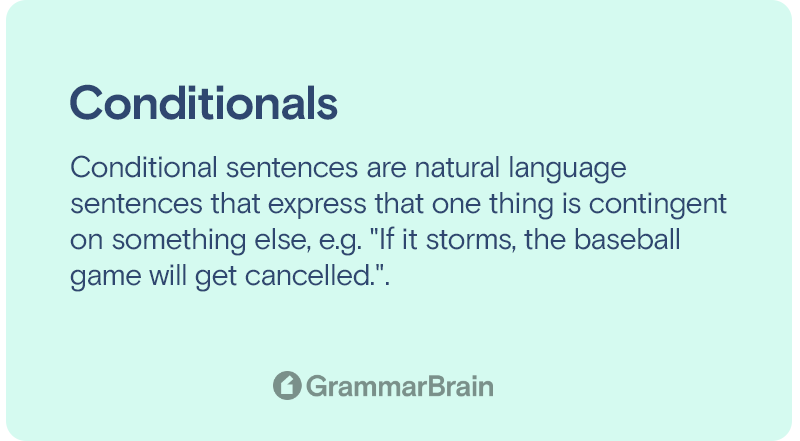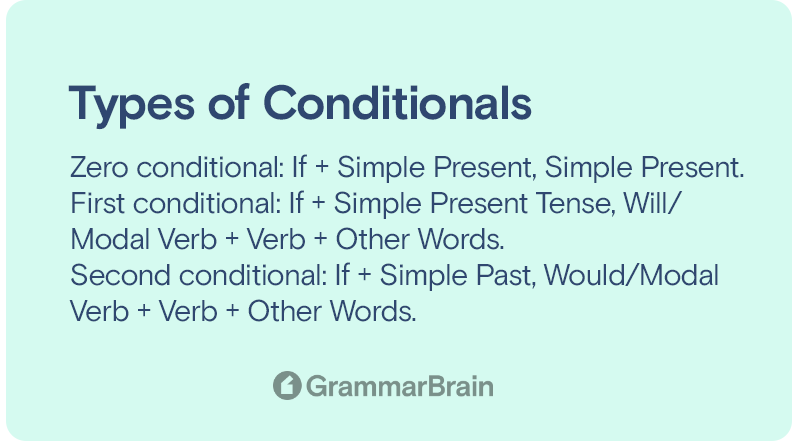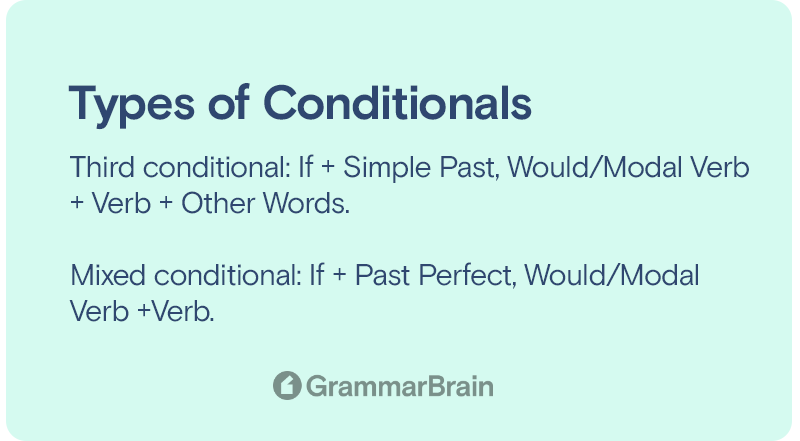What are conditionals? How do they work? How are they used in a common sentence? These are all great questions that you may have regarding conditionals in the English language. To learn more about their function, read the comprehensive guide below.

What are conditionals?
Conditionals describe the results when a situation or a condition occurs. In English grammar, if clauses are conditionals.
| Form | Definition |
| Conditional | Conditional sentences are natural language sentences that express that one thing is contingent on something else, e.g. “If it storms, the baseball game will get cancelled.”. |
What is the basic structure of conditionals?
The basic structure of conditionals is “if clause, main clause”. Here, the “if clause” tells about the situation or condition and the main clause describes the result of the condition.
For example, “If you apply for the job position now, you will get a call for an interview soon”. The “if” speaks about a condition (if you apply for the job position now) and the main clause describes the result (you will get a call for an interview soon).
In conditionals, both parts of the sentence have a verb tense. It could be the past, the present, or the future.
Here is a brief explanation of the different types of conditionals.

Five types of conditionals
In English grammar, there are five types of conditionals which are zero conditional, first conditional, second conditional, third conditional, and mixed conditional. The “mixed conditional” is not regularly used.
1. Zero conditional
Zero conditional is used to describe a situation whose results are always true and factual. The “if clause” in zero conditional is written in simple present and the main clause is also written in simple present. That said, instead of the “if clause”, “when” is also used to construct zero conditional sentences.
Structure: If + Simple Present, Simple Present.
When + Simple Present, Simple Present.
Examples:
- If you heat water, it boils. This is a fact. In this example, whenever water is heated, the water always boils. Both parts of the sentence are in the simple present tense.
- If you throw a ball in the air, it comes down. This is also a fact. Whenever a ball is thrown in the air, the ball always comes down.
- When you water the plant, the plant grows. The plant always grows when it is watered.
2. First conditional
First conditional describes a situation or condition that will probably happen and if it happens what will be the result? Here, the first part of the sentence is in simple present, and the second part is in simple future.
Structure: If + Simple Present Tense, Will/Modal Verb + Verb + Other Words.
Examples:
- If he comes to my Math classes, I will teach him Geometry.
- If she participates in the singing competition, she will win the competition.
- If it floods, the city will face heavy property losses.
3. Second conditional
The second conditional describes an imaginary situation whose result is also imaginary. To explain it in simpler words, if this event takes place, this result might happen.
Structure: If + Simple Past, Would/Modal Verb + Verb + Other Words.
Examples:
- If I earned million dollars in salary, I would become the richest person in the city. Here, the condition is hypothetical whose outcome is imaginary.
- If I owned a private jet, I would travel all over the world.
- If she worked hard for her promotion, she would become the CEO of the company.

4. Third conditional
The third conditional describes a hypothetical situation in the past and its outcomes that might have happened in the past.
Structure: If + Past Perfect, would/ modal verb have + Past Participle.
Examples:
- If I had won the mandate, I would have removed most of the aging laws. The example discusses a hypothetical situation (if I had won the mandate) happening in the past and its possible result (I would have removed most of the aging laws).
- If she had trained well for the badminton tournament, she would have won the tournament.
- If she had studied harder for the exams, she would have ranked first in her class.
5. Mixed conditional
The mixed conditional describes something that had happened in the past but its consequences happen in the present.
Structure: If + Past Perfect, Would/Modal Verb +Verb.
Examples:
- If I had learned to cook, I would cook many dishes now.
- If he had studied English, he could write in English now.
- If she had invested in the right stocks, she could be a billionaire now.
FAQs
What is the difference between zero and first conditionals?
Both, zero and first conditionals have simple present tense. The major difference between them is the zero conditional generally talks of the present whereas the first conditional describes a condition whose result will take place in the future.
Examples:
- If I am thirsty, I drink water. This is a zero conditional example. It is in the present.
- If I am thirsty, I will drink water. This is the first conditional example that describes an outcome that will happen later.
How to identify conditional sentences
If the sentence contains an “if clause” and a “main clause”, the sentence is a conditional sentence. A conditional sentence has two parts. The “if” clause talks about a possible condition and the main clause expresses the consequence of that condition.
What are conditional statements?
Conditional statements are used to perform different actions based on different conditions. A conditional statement is one that has a conditional clause attached to it.
Sources
- Conditionals | Grammar | EnglishClub
- Conditional | EF | Global Site
- Conditionals 1 | LearnEnglish
- Conditionals overview, English Grammar
Inside this article
Fact checked:
Content is rigorously reviewed by a team of qualified and experienced fact checkers. Fact checkers review articles for factual accuracy, relevance, and timeliness. Learn more.
Core lessons
Glossary
- Abstract Noun
- Accusative Case
- Anecdote
- Antonym
- Active Sentence
- Adverb
- Adjective
- Allegory
- Alliteration
- Adjective Clause
- Adjective Phrase
- Ampersand
- Anastrophe
- Adverbial Clause
- Appositive Phrase
- Clause
- Compound Adjective
- Complex Sentence
- Compound Words
- Compound Predicate
- Common Noun
- Comparative Adjective
- Comparative and Superlative
- Compound Noun
- Compound Subject
- Compound Sentence
- Copular Verb
- Collective Noun
- Colloquialism
- Conciseness
- Consonance
- Conditional
- Concrete Noun
- Conjunction
- Conjugation
- Conditional Sentence
- Comma Splice
- Correlative Conjunction
- Coordinating Conjunction
- Coordinate Adjective
- Cumulative Adjective
- Dative Case
- Determiner
- Declarative Sentence
- Declarative Statement
- Direct Object Pronoun
- Direct Object
- Diction
- Diphthong
- Dangling Modifier
- Demonstrative Pronoun
- Demonstrative Adjective
- Direct Characterization
- Definite Article
- Doublespeak
- False Dilemma Fallacy
- Future Perfect Progressive
- Future Simple
- Future Perfect Continuous
- Future Perfect
- First Conditional
- Irregular Adjective
- Irregular Verb
- Imperative Sentence
- Indefinite Article
- Intransitive Verb
- Introductory Phrase
- Indefinite Pronoun
- Indirect Characterization
- Interrogative Sentence
- Intensive Pronoun
- Inanimate Object
- Indefinite Tense
- Infinitive Phrase
- Interjection
- Intensifier
- Infinitive
- Indicative Mood
- Participle
- Parallelism
- Prepositional Phrase
- Past Simple Tense
- Past Continuous Tense
- Past Perfect Tense
- Past Progressive Tense
- Present Simple Tense
- Present Perfect Tense
- Personal Pronoun
- Personification
- Persuasive Writing
- Parallel Structure
- Phrasal Verb
- Predicate Adjective
- Predicate Nominative
- Phonetic Language
- Plural Noun
- Punctuation
- Punctuation Marks
- Preposition
- Preposition of Place
- Parts of Speech
- Possessive Adjective
- Possessive Determiner
- Possessive Case
- Possessive Noun
- Proper Adjective
- Proper Noun
- Present Participle
- Prefix
- Predicate



